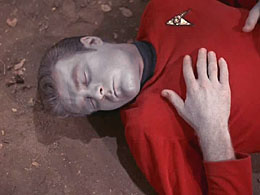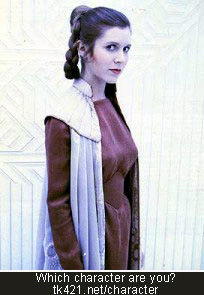 Directed by: Leonard Nimoy
Directed by: Leonard NimoyWritten & Produced by: Harve Bennett
Executive Producer: Gary Nardino
Cinematography by: Charles Correll, A.S.C.
Art Director: John E. Chillberg II
Edited by: Robert F. Shugrue
Associate Producer: Ralph Winter
Music by: James Horner
Cast: William Shatner, DeForest Kelley, Christopher Lloyd, James Doohan, George Takei, Walter Koenig, Nichelle Nichols, Merritt Butrick, John Larroquette, Mark Lenard, Robin Curtis
1984 / 105min / Rated PG
The U.S.S. Enterprise heads home, damaged from its battle with Khan, and still mourning the death of Spock. When Ambassador Sarek informs Kirk that Spock's soul is being carried by Dr. McCoy and can be restored to his body, Kirk and his crew steal the Enterprise to return to Genesis to save their friend. But when a Klingon bird-of-prey learns of the Genesis planet, its commander sets out to capture the secret of Genesis for the Klingon Empire.
After getting his wish to be killed off in The Wrath of Khan, Leonard Nimoy had such an enjoyable time making that film that he decided that he wanted to remain associated with Star Trek after all. Nimoy was not only granted his request to return, but also given the opportunity to direct as well. Given Spock's situation at the end of The Wrath of Khan, the only way to go about the sequel was to set out to resurrect him. And unless the filmmakers really wanted to alienate fans, the outcome is rather predictable. So The Search for Spock is meant to be more about the journey then it is the destination.
As far as story goes, The Search for Spock is rather predictable. There is only one way for the movie to end. So what do the filmmakers do to keep the viewer interested in the journey? Thrown into the mix is a Klingon commander (Christopher Lloyd) bent on acquiring the secret of Genesis to use for the glory of the Klingon Empire. Kruge is no Khan and Lloyd is able to make him a passable villain. He isn't a memorable villain, but he is able to get the job done. The final hand-to-hand battle between Kirk and Kruge in the midst of the destruction of the Genesis planet is technically effective, but when it comes to payoff, it doesn't match the satisfaction we get when we see Khan die. Where there was history to the Kirk-Khan rivalry that fueled the satisfaction in seeing Kirk defeat Khan, there isn't enough invested in the Kirk-Kruge rivalry to give any punch to Kruge's eventual death.
Just as the Battle in the Mutara Nebula was the highlight of The Wrath of Khan, the highlight of The Search for Spock is easily the theft of the Enterprise. With the Enterprise being decommissioned and the crew to be reassigned, Kirk is not allowed by Starfleet Command to take the Enterprise to Genesis to recover Spock based upon "Vulcan mysticism", as explained by Ambassador Sarek in a poignant scene in which Sarek mind-melds with Kirk, forcing Kirk to relieve Spock's death.
With no other choice, the crew of the Enterprise steal back their ship in a pulse-pounding scene that is so well played, directed, written and scored that it's the film's high point. This easily stands out as one of the best sequences in not only any of the Star Trek sequences, but the entire franchise as well.
Performances are wonderful, particularly from both William Shatner and DeForest Kelley. Kelley must portray a man in the midst of inner turmoil, struggling with both his own eccentricities and the mind of Spock. Spock and McCoy have been polar opposites from the beginning of the series, with Spock being logical and McCoy emotional. The pairing is quite intriguing and Kelley is excellent. Particularly of note is a short, quiet scene near the end where the crew has just left Genesis on their way to Vulcan, and McCoy tries to wake up an unconscious Spock. It's a small but poignant scene in which McCoy expresses to Spock that he's missed him, despite all their arguing and bickering. It's a great character moment because it shows that no matter their difference, these two are close friends. Kelley's performance is right on the money.
Shatner plays Kirk here as rather subdued and somber, having just lost his best friend, a brother. It's probably Shatner's finest performance as Kirk, portraying his grief and determination wonderfully. Particularly well handled is Kirk's reaction to the death of his son at the hands of the Klingons, immediately followed by Kirk's determination to defeat the Klingons in true Kirk fashion. As McCoy states, Kirk turns "death into a fighting chance to live". Shatner is brilliant.
Two major shocks come within a matter of minutes of each other. When the Klingons reach Genesis, they destroy the U.S.S. Grissom and take Saavik (here portrayed rather blandly by Robin Curtis), David and a young, regenerating Spock captive. When confronted by the Enterprise, the Klingons unknowingly cripple the starship, manned only by Kirk, McCoy, Scotty, Chekov and Sulu. In an attempt to get the secret of Genesis, Klingon Commander Kruge orders the execution of one of his hostages, resulting in David's death as he saves Saavik from being executed. As mentioned before, Shatner portrayal of Kirk's grief is wonderful.
Within only a matter of minutes, in a last-ditch attempt to save his crew, rescue his friends from the planet below, and beat the Klingons, Kirk sets the auto-destruct sequence on the Enterprise, destroying the ship and the Klingon boarders. The sequence is suspenseful and shocking, providing the plot twist just as shocking as Spock's death in the previous film. It's rather appropriate, and more on that in a moment.
The Search for Spock is a mirror of The Wrath of Khan. Khan is most definitely a hard act to follow, near impossible really, but The Search for Spock lives up to the challenge by being a companion, if not an equal. While The Search for Spock comes themes that parallel The Wrath of Khan, particularly with life and death. In order to save Spock, Kirk must sacrifice everything for a man who gave his life for everything.
At the end of Khan, Spock dies during the birth of the Genesis planet. In Spock, the Genesis planet dies during the "rebirth" of Spock. Just as Kirk rediscovered his son at the end of Khan, here Kirk regains Spock just as he loses his son. And just as Spock sacrificed his life to save the Enterprise, the Enterprise is sacrificed to save Spock. The parallels to this film's predecessor are quite poignant.
The film ends rather anticlimactically with the resurrection of Spock, but given everything that has happened over the course of this movie and the one before it, it's rather fitting and somber. And the final scene between Kirk and the fully restored Spock (finally portrayed by Leonard Nimoy) is wonderfully written, acted and directed. It makes for a very poignant and touching finale, one that the film deserves. James Horner's score during the return to Vulcan is rather powerful and effective as we witness the approach of the captured Klingon vessel, and
James Horner's score is strongest during the return to Vulcan, the prologue and credits, and the theft of the Enterprise. His Klingon theme is rather forgettable and no where near as strong as Goldsmith's theme for the Klingons. His score is rather derivative of his own score for The Wrath of Khan, but it is still quite strong, if not original.
The special effects are strong, but are limited due to a small budget, but they are still good. The effects are strongest during the destruction of the Enterprise, which remains the film's visual standout.
The film's major setbacks remain a predictable outcome, as well as a lackluster villain who is only passable. Could The Search for Spock have been better? Probably. But given it came on the heels of The Wrath of Khan, it's a strong and worthy sequel, and probably the strongest of all the "odd-numbered" films.


 (of 4)
(of 4)








